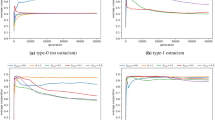Abstract
Social scientist define social capital as a feature or attribute of an organisation or an individual that facilitates cooperation to achieve mutual benefit and enhances their ability to solve collective action problems. In this paper we present a set of experiments on an electronic version of social capital in two different scenarios of repeated pairwise interactions amongst agents. The results show that (i) social capital can be represented in a computational form, and (ii) that the use of social capital does indeed support effective collective action. These results offer a convincing demonstration that being able to represent and reason about (electronic) social capital provides a compelling alternative solution to cooperation dilemmas in multi-agent systems.
Access this chapter
Tax calculation will be finalised at checkout
Purchases are for personal use only
Preview
Unable to display preview. Download preview PDF.
Similar content being viewed by others
References
Bourdieu, P., Wacquant, L.: An invitation to reflexive sociology. Chicago University Press (1992)
Bowling, M., Veloso, M.: Multiagent learning using a variable learning rate. Artificial Intelligence 136(2), 215–250 (2002)
Jones, A.J.: On the concept of trust. Decision Support Systems 33(3), 225–232 (2002)
Lachmann, L.: Capital and its structure. Sheed, Andrews and McMeel (1978)
Macbeth, S., Pitt, J., Schaumeier, J., Busquets, D.: Animation of self-organising resource allocation using presage2. In: 6th IEEE Conference on Self-Adapting and Self-Organising Systems (SASO), pp. 225–226 (2012)
Mailath, G.J., Samuelson, L.: Repeated Games and Reputations: Long-Run Relationships. Oxford University Press (2006)
Mayer, R.C., Davis, J.H., Schoorman, F.D.: An Integrative Model of Organizational Trust. The Academy of Management Review 20(3), 709–734 (1995)
Myerson, R.B.: Game theory - Analysis of Conflict. Harvard University Press (1997)
Ostrom, E.: Governing the Commons. Cambridge University Press (1990)
Ostrom, E., Ahn, T.: Foundations of Social Capital. Edward Elgar Publishing (2003)
Pinyol, I., Sabater-Mir, J.: Computational trust and reputation models for open multi-agent systems: a review. Artificial Intelligence Review 40(1), 1–25 (2013)
Pitt, J., Nowak, A.: The reinvention of social capital for socio-technical systems. IEEE Technology and Society Magazine 33(1), 27–80 (2014)
Pitt, J., Busquets, D., Macbeth, S.: Distributive justice for self-organised common-pool resource management. ACM Transactions on Autonomous and Adaptive Systems (to appear, 2014)
Putnam, R.D.: The prosperous community: Social capital and public life. The American Prospect, 35–42 (1993)
Rescher, N.: Distributive Justice. Bobbs-Merrill (1966)
Sugawara, T.: Emergence and stability of social conventions in conflict situations. In: 22nd International Joint Conference on Artificial Intelligence (IJCAI), pp. 371–378 (2011)
Vasalou, A., Pitt, J.: Reinventing forgiveness: A formal investigation of moral facilitation. In: Herrmann, P., Issarny, V., Shiu, S.C.K. (eds.) iTrust 2005. LNCS, vol. 3477, pp. 146–160. Springer, Heidelberg (2005)
Yu, C., Zhang, M., Ren, F., Luo, X.: Emergence of social norms through collective learning in networked agent societies. In: 12th International Conference on Autonomous Agents and Multi-Agent Systems (AAMAS), pp. 475–482 (2013)
Author information
Authors and Affiliations
Editor information
Editors and Affiliations
Rights and permissions
Copyright information
© 2014 Springer International Publishing Switzerland
About this paper
Cite this paper
Petruzzi, P.E., Busquets, D., Pitt, J. (2014). Experiments with Social Capital in Multi-agent Systems. In: Dam, H.K., Pitt, J., Xu, Y., Governatori, G., Ito, T. (eds) PRIMA 2014: Principles and Practice of Multi-Agent Systems. PRIMA 2014. Lecture Notes in Computer Science(), vol 8861. Springer, Cham. https://doi.org/10.1007/978-3-319-13191-7_2
Download citation
DOI: https://doi.org/10.1007/978-3-319-13191-7_2
Publisher Name: Springer, Cham
Print ISBN: 978-3-319-13190-0
Online ISBN: 978-3-319-13191-7
eBook Packages: Computer ScienceComputer Science (R0)




